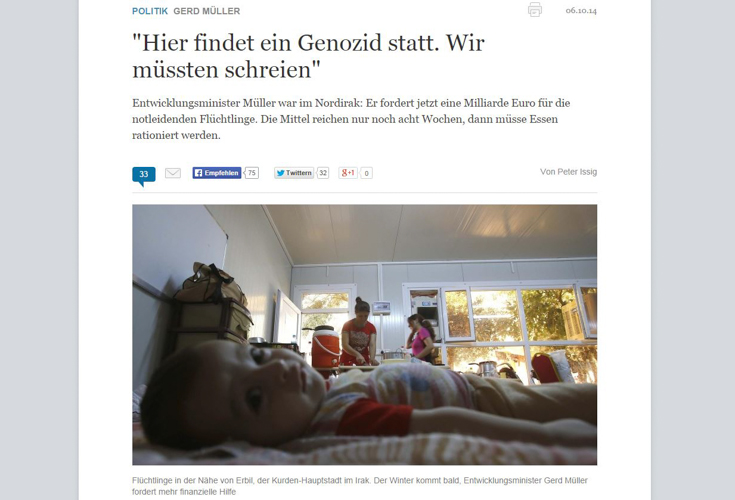Last week, German Development Minister Gerd Müller visited the Kurdish metropolis of Erbil in Northern Iraq for two days to get informed about the situation of the refugees and about the threat posed by the terror militia of the so-called Islamic State (IS). The politician of the CSU party demands an emergency program for the region. At least one billion Euros are needed there.
Die Welt: What is your impression of the situation in Northern Iraq?
Gerd Müller: The refugee situation is dramatic, particularly in Dohuk (the capital of the governorate Dahuk in the Autonomous Kurdistan Region). Thousands of people live on the streets, without tents. But the willingness of the Kurdish population to help is overwhelming. Therefore, the refugees describe the Kurdish territory in Northern Iraq as a safe haven.
Die Welt: Will it stay that way?
Müller: The refugee numbers are increasing. Nechirvan Barzani, Prime Minister of the Kurdistan Regional Government, stated that of the 26 camps that are needed, only eight are completed and further ten are under construction. And there are only eight weeks left until the rain and then the snow comes. If something does not happen quickly, thousands will not survive this winter. That would be a catastrophe – and a shame for the international community. It is unacceptable that we successfully cooperate in taking military action against the IS terror militia while the population is freezing and starving behind the front.
Die Welt: What can the international community do?
Müller: The aid organizations on location are working very well. But financial recourses only last for another six to eight weeks, and then food has to be rationed. Therefore, I have pledged to emphatically put forward this issue in the European Union. I strongly request the new President of the EU Commission Jean-Claude Juncker to make help for the people who are fleeing from the IS terrorists his first priority. He has to assign an emergency refugee-commissioner, and instantly provide a billion Euros for refugees from available funds. Next to the military and civil support, the EU and the UN diplomatically have to start a peace initiative to stop the war in Syria and to protect the Yezidis and Christians in Iraq.
Die Welt: To which extent does Germany play a role?
Müller: For the refugees in Northern Iraq we increased our support in August by another 20 million Euros. Additionally, as an answer to our request, I have received signals from the Budget Committee and the Ministry of Finance that we will be able to noticeably contribute again before the winter. At least one camp in the North of Iraq can therefore be built through our support. This camp is supposed to offer shelter and refuge especially to women and children who have been victims of torture and rape.
Die Welt: Do you see a special need for action in this area?
Müller: I have talked to traumatized women myself. The atrocities that were reported to me are upsetting. Women told me about their village, where 400 men were executed. The girls and women were displaced, raped and sold. Genocide is happening. It is a sting directly into the heart. We all have to cry out.
Die Welt: Should Germany offer refuge to the victims?
Müller: The solution lies here, in the region. The people want to stay in their home country.
Die Welt: The international arms supply has commenced; what is the perception of the local security situation?
Müller: I also met people which had just returned from the front, and which reported that the liberation of several villages succeeded, which were under IS control. But the situation certainly remains difficult, and the reports which depict the human suffering and misery are and remain horrible.
Die Welt: Was more demanded?
Müller: Not towards me. But we were explicitly thanked for the supplies. The combats are only a few hours away from Erbil. Currently, the city is safe and the perception prevails that IS troops cannot further advance.
Die Welt: How do you perceive the relation between the Kurds and the Iraqi Government in Baghdad?
Müller: The relation is difficult. Kurdish Premier Barzani ensured me that the Kurds hold on to the unity of Iraq. However, the entire burden of the stream of refugees is carried by the Kurdistan Regional Government. Baghdad does not contribute to tackling the internal Iraqi problems. Budget funds are still blocked. Nevertheless, the Kurds remain loyal to Baghdad and are interested in stability.
Die Welt: Does Iraq fear the formation of an independent Kurdish state?
Müller: Last week I already spoke with the Iraqi Foreign Minister and assured him, that Europe, just as Germany, adheres to the unity of Iraq. Furthermore, I don’t see any reason to doubt the respective statements of the Kurds.
Die Welt: Is more military assistance necessary?
Müller: At the moment, the priority must be to increase actions which secure the survival of the refugees. For this purpose, we all are in demand. Further, I have to pay tribute and respect to the Kurds. They opened the door and accommodated refugees without limitations, although many of them don’t have much money and or a lot to eat. The poor don’t turn away. That should be a signal for us to assume more solidarity and responsibility.
For the original article (only in German available), click here.
